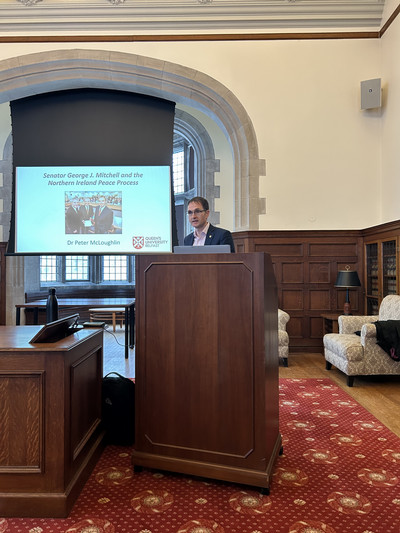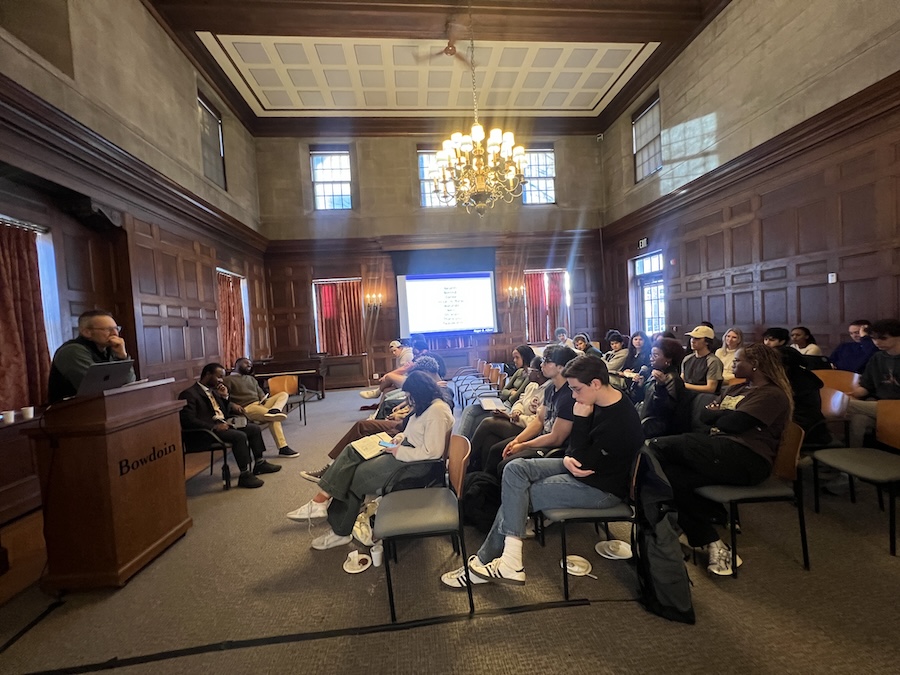David Maraniss Discusses Biography and the Search for Truth
By Tom Porter
Pulitzer prize-winning author and journalist David Maraniss was on campus April 12 to deliver the lecture The Art of Biography and the Search for Truth. Maraniss, an associate editor at The Washington Post, is the author of eleven best-selling and critically acclaimed books including biographies of Bill Clinton and Barack Obama, and sporting legends Roberto Clemente and Vince Lombardi. He has also completed a trilogy of books capturing the social history of the 1960s, culminating with his latest work, Once in a Great City: A Detroit Story.
Maraniss spoke with Bowdoin College writer and multimedia producer Tom Porter
Listen to the interview with David Maraniss (audio may take a few seconds to load):
Edited Interview Transcript:
Tom Porter: Why did you choose to call this lecture The Art of Biography and the Search for Truth?
David Maraniss: I like to talk about the need for the search for truth particularly in this modern era, where the platforms of information are changing. There’s so much more information out there but also more misinformation so to do serious biography or non-fiction narrative writing, requires a belief that there is a truth out there which means you have to go out and find the facts as much as you can. And in this modern world where people are just sitting at home blogging about things without going out and trying to find the facts, I think it’s more important than ever.
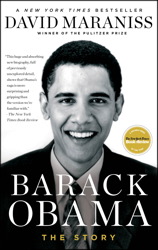 In my speech I talk about what I call the four legs of the table in the search for truth: The first is to go there, wherever “there” is that I’m writing about, to understand the culture and sociology and geography of the place, the forces that shape people; the second is to find the archives wherever they are, the documents that help substantiate the reality; the third are the interviews, for some of my books I’ve interviewed as many as 400 people but it’s not the number of interviews that count but the quality of them; and the fourth leg of my table is to look for what’s not there, which means to try to go past the encrusted mythology of a story to find the real story.
In my speech I talk about what I call the four legs of the table in the search for truth: The first is to go there, wherever “there” is that I’m writing about, to understand the culture and sociology and geography of the place, the forces that shape people; the second is to find the archives wherever they are, the documents that help substantiate the reality; the third are the interviews, for some of my books I’ve interviewed as many as 400 people but it’s not the number of interviews that count but the quality of them; and the fourth leg of my table is to look for what’s not there, which means to try to go past the encrusted mythology of a story to find the real story.
TP: When you’re writing a biography of someone, do you interview to the subject?
DM: It depends. If the subject is dead I tend not to speak to them, if the subject is the president of the United States, I’m one for two in that regard. Although for biography of Bill Clinton – First in His Class – I interviewed him eight times at length before he was president but that was also before I started the book and once I started the book for various reasons, the interviews never happened. For my biography of President Barack Obama I did inteview him, so rather than say I never interview the suvject I would say that if the subject is alive and available, it’s not the most important interview – rarely in fact – but it’s important that you have enough information when you get to that point that you get deeper than the story that the subject is always told.
TP: So it wouldn’t be the first interview you do?
DM: For Barack Obama it was last interview.
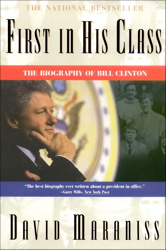 TP: Now you mentioned the Bill Clinton biography you wrote, First in His Class. That was published 20 years ago, before the digital explosion, before the huge proliferation of information that we all have access to now. How did it differ writing a biography back in those days compared to now?
TP: Now you mentioned the Bill Clinton biography you wrote, First in His Class. That was published 20 years ago, before the digital explosion, before the huge proliferation of information that we all have access to now. How did it differ writing a biography back in those days compared to now?
DM: In so many different ways. First of all, nothing was online, for better or for worse. As I said, you get a lot of misinformation online, but you get a lot of archival documentary information that is online now that’s invaluable. So rather than spending three weeks going to a library and going through old clips, you can find a lot of that online in old newspaper articles. The level of misinformation has increased because of the Internet, so you can go down more rabbit holes if you’re not careful now. But I think the basic process for me is the same. I will say one difference, when I started with that Clinton book I organized it on index cards. I had shoeboxes full of thousands of index cards, and now it’s all organized online.
TP: You also wrote a book about Barack Obama, and both of your presidential biographies looked at the early years before they became president. Are you inclined to write follow-up biographies, covering their presidential years?
DM: Yes, but for President Obama I’m going to wait. He will have his own presidential memoir coming out with which will get the largest advance in American publishing history, and be vastly read. I want to wait until about five years after his presidency so there’ll be some records at the Obama presidential library and other places that will be more available, and people will be more willing to speak. I”m going to do another Clinton book as well but it won’t be my next book it will be the one after that.
TP: Looking at the current nomination battle, do any of the characters there pique your interest as a possible biography?
DM: No. The Washington Post, where I’ve worked for 39 years, is doing a biography of Trump. They just announced it and they have like two main writers and 24 other reporters working on it. It’s not for me, I don’t do that kind of mass thing anyway. My books take three to three-and-a-half years, I don’t want to do one in two months. I”m not sure I would want to do Trump in any case, and Hillary is a major character in my first Clinton and will be in my next one, so I’m not going to a separate biography of hers. I just have other interests right now.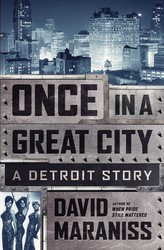
TP: Your latest book, “Once In a Great City,” is a sort of biography of the city of Detroit, where you’re from. And you start off talking about what a strong, vibrant place it was in the early 60s, with the music industry, the car industry, and you explain how and why it all went wrong. And one of things you talk about is how the seeds of the city’s downfall were really there from the beginning weren’t they?
DM: Yeah, they were. I write about Detroit in 1963 as this bright shining star that was actually a dying star. Detroit was already de-populating. There was a study by sociologists at Wayne State University that said it would lose a half a million people by the end of the 1960s, and that trend would continue just destroying the tax base of the city because “productive” people would be leaving, with only people needing government services staying behind. The city was a one-industry town to a dangerous extent and the car industry itself was leaving Detroit both financially and emotionally. Detroit was an example of urban renewal’s worst unintended consequences. In that period urban had virtually destroyed the traditional African-American neighborhoods in the city, with freeways making it easier for “white flight”, creating more tension in various neighborhoods. Detroit had a long history of racial tension already, going back to World War Two when there was a horrible race riot in the city, and that was played out in the 60s in various ways. So all of those factors combined, and even at that point when Detroit seemed to be thriving you could see its destruction coming.
TP: That personally was maybe the saddest book you have written?
DM: Well, I would say so, except that I’ve gone back to Detroit 10 times since the book came out and you can see the seeds of its recovery. The downtown area is now thriving. That’s a small part of what a city is comprised of. There’s also a pocket near the museums and Wayne State University where young people are going, creating sort of a new Brooklyn in a sense there. The population is increasing for the first time in decades. There are still vast swathes of the city that are pretty desolate and that part is somewhat despairing, I mean I went to the flat I lived in when I was six years and it had just been torn down.
TP: And being from Detroit I imagine you’re not a Green Bay Packers fan but you wrote a book about Vince Lombardi..
DM: Wrong assumption! I was born in Detroit, my earliest memories are there but I spend most of my youth in Madison, Wisconsin, and I grew up with Lombardi and the Packers. Whenever I’m in Detroit and they say I’m a Detroit native I say yes, I was born there, but I’m a Packers fan. And Lions fans understand because they’ve never won a championship!
TP: And Lombardi did of course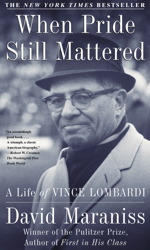
DM: He won five in nine years.
TP: Beyond being a Packers fan why did you choose Lombardi?
DM: Because he represented so much beyond football. Whenever I’m writing a story that is ostensibly about sports, I do love sports but I’m looking for a larger story as well, and Lombardi was a way to write about the mythology of competition and success in American life, what it costs and what it takes, a way to write about leadership and so many things that were interesting to me beyond just the Packers. So I’m not going to write a book about Aaron Rodgers, who’s my favorite football player now I don’t think, but Lombardi was more than that.

